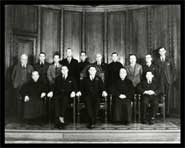The report, Leading the World: the economic impact of UK arts and humanities research, highlights the international pre-eminence of the UK’s arts and humanities research community and argues that it is a vital part of the UK’s economy and society.
The History of the Chinese Maritime Customs Service (1854-1949) project, led by Professor Robert Bickers in the Department of Historical Studies, was praised for its distinctive economic impact. This research aimed to advance understanding of the modern Chinese state and of imperial history by making the extensive Chinese Maritime Customs Service archive at the Second Historical Archives of China, Nanjing fully accessible to scholars.
This project was able to clarify the legal status of the Customs in response to British Foreign & Commonwealth Office enquiries, and, in its work on the Historical Photographs of China, contribute to the development of better British understanding of Chinese culture that has been underlined as a necessity in the Government's most recent China policy document.
Professor Bickers’s work was also cited as a successful example of knowledge transfer. Under the AHRC’s ‘Knowledge Catalyst’ programme which allows researchers to work with a company on a particular business-related project, the Bristol team worked with the Met Office’s Hadley Centre, one of Britain’s major centres for climate change research, to identify records of climate conditions in nineteenth century East and South East Asia.
This resulted in the most comprehensive inventory to date covering historical Chinese instrumental weather observations. It also highlighted the need to bring the China Meteorological Administration and other Chinese institutions into a collaboration to extract the full extent of material this inventory has uncovered – an interaction that the Atmospheric Circulation Reconstructions over the Earth initiative (ACRE) has been working to achieve for some time.
Research by Professor Rachel Murray in the School of Law was highlighted for the important advances it has made in reducing the likelihood of torture around the world. Her project concerns the Optional Protocol to the UN Convention against Torture, Inhuman and Degrading Treatment and provides for a system of visits to places of detention to be carried out by independent national and international bodies with the aim of combating torture and preventing it from occurring.
This project has resulted in NGOs in this area receiving a right of audience to an important UN Committee and has led to its researchers gaining an international profile, so that they are consulted by the UK and foreign governments.
The AHRC report also highlighted the Penguin Archive Project as an example of large-scale collaborative research across disciplinary boundaries and praised its “multifaceted, multidisciplinary approach… brought about by the bringing together of the Departments of English, Historical Studies and Classics at the University of Bristol.”
The British Inter-University China Centre (BICC), a collaboration between the Universities of Bristol, Oxford and Manchester was also mentioned in the report. It is one of five Language-Based Area Studies Centres, established by the AHRC in collaboration with ESRC, HEFCE and SFC, to sustain and encourage research in the strategically important areas of the Arabic speaking world, China, Japan and Eastern Europe. The BICC has had a significant engagement with the Foreign & Commonwealth Office, and with other public bodies.
